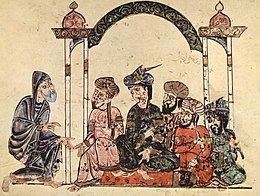| Part of a series on |
| Arabic culture |
|---|
 |
Ghinnawas (literally "little songs") are short, two line emotional lyric poems written by the Bedouins of Egypt, in a fashion similar to haiku, but similar in content to the American blues.[1] Ghinnawas typically talk of deep, personal feelings and are often an outlet for personal emotions which might not be otherwise expressible in Bedouin society. Ghinnawas may also be sung. Lila Abu-Lughod, the Palestinian American anthropologist who studied the Awlad Ali Bedouins in Lower Egypt in the late 1970s and collected over 450 ghinnawas, has published the most comprehensive work on ghinnawas to date.[1]
Ghinnawa is a form of folk poetry, in the sense that anyone in Awlad Ali society could author a ghinnawa. In a broader context, the ghinnawa may be looked upon as non-standard discourse that is a means of coping with social reality, similar to other discourse forms in the Arab world like the hikaya folktales of Tunisia or the gussa allegories of the Bedouin of the Sinai Peninsula.[2]
- ^ a b Veiled Sentiments: Honor and Poetry in a Bedouin Society, by Lila Abu-Lugodh, University of California Press, Berkeley, 1986
- ^ Between segmentation and desegmentation: Sound expressions among the Berbers in the Sous region (Southwestern Morocco), by Horiuchi Masaki, Cultures Sonores d'Afrique (ed. J. Kawada), Tokyo University of Foreign Studies, Tokyo, 1997
© MMXXIII Rich X Search. We shall prevail. All rights reserved. Rich X Search
